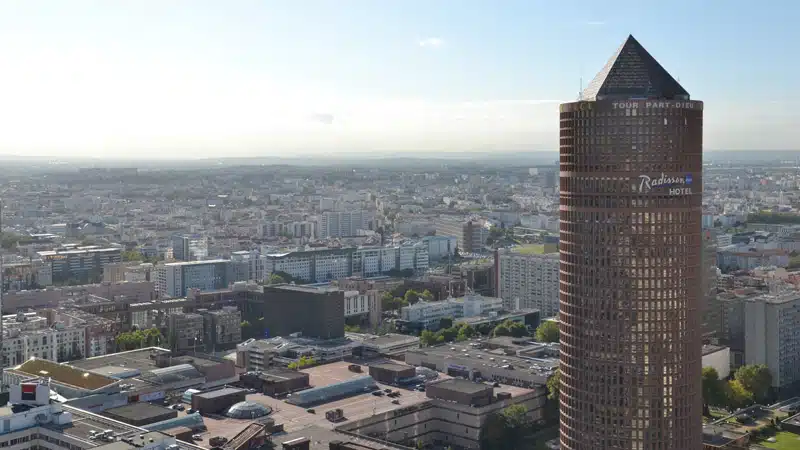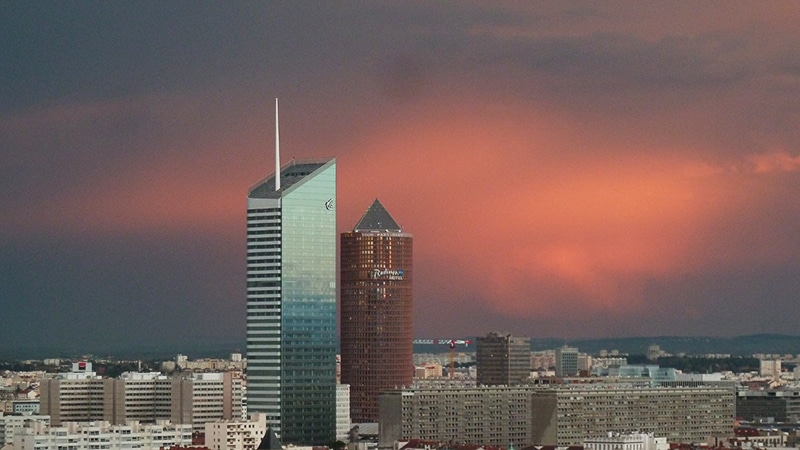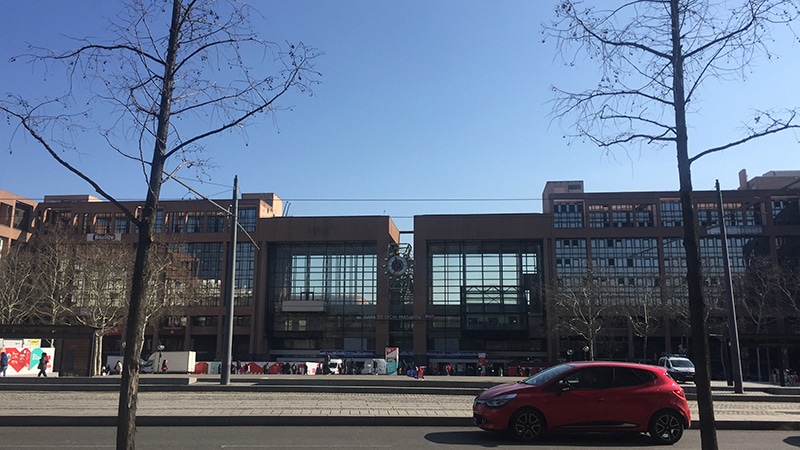
4th Arrondissement (district) of Lyon
The fourth district and the plateau of the Croix Rousse is well-known for its traboules (passageways), market, artists and silk history.

View of Lyon’s third district from Incity tower
Located in the east of Lyon, on the left bank of the Rhône, the 3rd district is the most populated one in the city. It is also the economic heart of Lyon thanks to the Part-Dieu business center.
Lyon’s 3rd district is one of the nine districts which make up the city of Lyon. Located in the east of the city, it was created in 1852 and has had its present borders since 1912. It is often considered as Lyon’s other center after the Presqu’île.
It is the most populated district in the city with 102 000 inhabitants (one fifth of Lyon’s population) and over 80 000 people who work there. It has witnessed a significant growth since the 1970s.

Incity and Part-Dieu towers in Lyon’s 3rd district © Frederic Crouzet
The commercial and tertiary division of the Part-Dieu offers numerous government and private employments. The third district holds Lyon’s tallest buildings, the Crayon (or the “Pencil”, 165 meters) and the Incity tower (200m).
The third district is made up of many neighbourhoods: Préfecture, Voltaire, Villette, Sans-Souci and Montchat.
Lyon’s third district is located in the eastern part of the city, on the left bank of the Rhône, between the 6th district and Villeurbanne to its North and the 7th district and the 8th district to its South.
The 3rd district is also adjacent to the city of Bron to the east.
Thanks to its central position in the agglomeration, the third district is easily accessible by car or public transport.
Two metro lines (B and D) and tramway lines 1,2 and 3 go through the district. Part-Dieu is also the starting point of the Rhônexpress shuttle which goes to the Saint-Exupéry airport.
The third district also has a railway station, Part-Dieu, which welcomes over 130 000 people everyday. It allows a connection between Lyon and the rest of the country, notably Paris (two hours away with the TGV train), as well as Europe with the Eurostar going to London.

Lyon Part-Dieu train station in the third district
By car, the third district is accessible at its eastern point by the Laurent-Bonnevay beltway, which allows a connection to the sector’s main thoroughfares: Avenue Lacassagne, Cours Lafayette, Rue Genas, Boulevard Vivier-Merle, Avenue Felix-Faure…
The third district was made up of swamps and agricultural land for a long time. Since the Medieval period, only the southern side, where the Pont de la Guillotière is, had existed as housing.
The urbanization of the 3rd district started after the French Revolution, when the city demolished its ramparts on the right bank of the Rhône and extended itself towards the east.
The architect Morand built a second bridge on the Rhône and established construction plans for the left bank of the Rhône.
In the 19th century, the prefect Vaïsse continued construction of the 3rd district based on Haussman’s model in Paris, with wide streets and beautiful buildings.
The prefecture was built in 1890 facing the Rhône. Military forts were built during the 19th century, including the remaining Monluc Fort (1831).
Part-Dieu may have gotten its name from an isolated fortified agricultural domain in the middle of the swamps, its presence having been discovered during the 13th century.

Lyon Part-Dieu area was a farm until the 19th century, then army barracks from 1850 to 1960, and now a business area.
During the 18th century, it belonged to the Mazenod-Servient family who gave it away to Lyon’s Civil Hospices, like multiple plots of land nearby.
These areas were then sold to the army in 1844 which turned the land into a barrack. In the 1960s, the army sold the land to the city of Lyon in order to build the Part-Dieu business center.
In 1971, the central food market (now Halles Paul Bocuse) was transferred from Cordeliers to the 3rd district.
The Part-Dieu tower was built in 1976. Opened in 1980, the Part-Dieu train station got its first TGV trains in 1981.
Numerous public and cultural buildings can be found in Lyon’s 3rd district. You can come across the Rhône prefecture, representing the State, the Metropolis of Lyon’s headquarters, the Nouveau Palais de Justice (or courthouse), the State’s administrative Complex which hosts national services and the Edouard-Herriot Hospital at Grange-Blanche.

Lyon Auditorium and the Part-Dieu tower, nicknamed “the pencil”. © Frederic Crouzet
Lyon’s public Library, the Bourse du Travail (or Labour exchange: a trade union house and theater), Lyon’s Auditorium and the Tête d’Or Theater can all be found in the third district.
You can also visit the Montluc Memorial, an old prison where many Resistance fighters from the Second World War were imprisoned, such as Jean Moulin.
The Part-Dieu shopping mall is also one of the district’s attractions with about 100 000 visitors everyday who go through the 260 stores. It is one of the biggest malls in France and in Europe.

The Part-Dieu shopping mall, one of the biggest in Europe © Frederic Crouzet
– Established in the 3rd district since 1971, Lyon’s Halles Paul Bocuse is a paradise for food enthusiasts. You can eat and buy a great number of local and international specialties.

Les Halles de Lyon Paul Bocuse in the third district. ©Jack Leone
– You can find many restaurants between the Bourse du Travail and the Palais de Justice, in the pedestrian part of Rue Moncey.
– If you want to drink a beer under the sun, it’s off to the Berges du Rhône you go. The old car parks on the banks gave way to a park, bike paths and multiple patios and boats which host bars and restaurants.
– The old neighbourhoods of the 3rd district, near the Rhône, are very sought after and some of the most expensive in Lyon. In particular near the Prefecture, a residential and central neighbourhood. Prices are between €4600 and €5300/m2 (2018)
– The price of housing is less expensive towards the train station and beyond the railway tracks, between €3500 and €4000 per square meter. The eastern part of the district has many recent buildings.
– The Montchat sector, established in the middle of the 19th century, is very sought after by families because of its village aspect and its big, beautiful houses.
.

The fourth district and the plateau of the Croix Rousse is well-known for its traboules (passageways), market, artists and silk history.

The historic heritage of the city from “Vieux Lyon” to Fourvière.

Daytime sightseeing and nighttime living.

From the past to the future in Lyon 2.